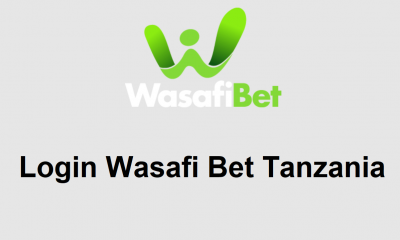Feature/OPED
Nigerian Youth and Sports Betting

By Jerome-Mario Utomi
Talking about young people, human development experts have described the stage as a moment of the storm, a stage in developmental growth where young adults want to explore and express themselves, as well as want to know more about the world.
This uncensored urge naturally comes with an inherent challenge which adversely affects the youth’s education and promotes social vices such as; premarital séxual escapades, instant gratification, the proliferation of fake news and the erosion of societal values.
But looking at recent commentaries, it is no longer an overstatement that our effort to create a more humane nation has recently witnessed a setback with the advent of sports betting on our shores.
This should, however, not be construed as a prediction of doom.
To explain; sports betting as a form of lottery or game of chance is neither restricted to a particular age nor séx but fuelled by the grinding poverty and starvation with which our country is currently afflicted.
In this context, there is nothing essentially wrong with sports betting if well regulated, but looking at the number of minds so far corrupted, and ‘destinies’ destroyed by this game, it becomes unfortunately true that like a turbulent ocean beating great cliffs into fragments of rocks, so has sport betting submerged our countrysides- bringing social, moral cultural and economic devastation upon our youths with their future now hanging on the balance.
Given this preceding awareness, nothing becomes more self-contradictory than the realization that an enabling Act backs its operation. Interestingly as it appears, the Act among other things provides for the establishment of the National Lottery Regulatory Commission charged with responsibility for the regulation of the business of national lottery in Nigeria as well as the establishment of a National Lottery Trust Fund.
Still on ‘gambling law’ in Nigeria, the law distinguishes between games of skill (which are legal) and games of chance (which are illegal). Legal forms of gambling include the lottery, land-based casinos and sports betting, whereas roulette, dice games and non-skilled card games are considered illegal. A significant relationship has been reported with age, gender, financial strain, some personality factors and depression.
Reports also said that monetary gain, fuelled by greed, unemployment, economic hardship and poverty are the most potent motivating factors for gambling and may act as a springboard to fuel criminality. Other less important factors are the pursuit of enjoyment, passion for sports and peer group influence.
From the above clarification, some pro-sports bet advocates have argued that what the Nigerian youths presently indulge in cannot be called a gamble as it has a regulatory agency; others at different times and places expressed similar sentiment saying that; since the winnings of sports bet are usually predicted on the outcome of legitimate games of soccer, addressing sports bet as a gamble cannot square up with logic as no good means can give birth to a bad end.
Arguably a well-chiseled position particularly when one remembers that sports betting provides a means of livelihood for the teaming operators. But before celebrating the vision and wisdom behind the above, it becomes more important that Nigerians first look at the crowd of young adults that daily fraternize with sports betting centres, review some ‘exciting progress’ recorded in this direction, and instincts coming from the larger society.
Going by reports, the cold truth is that beyond this advantage, its negative psychological effects such as; loss of fortune, loss of businesses, depression, death through suicide, assassination or heart attack, loss of sleep (insomnia) insanity, marital problems between the gambler and the young spouse as the gambler is always temperamental and agitated- on our youths, outweighs the usefulness.
But, even more, some well-meaning Nigerians had recently begun to question its usefulness to National development in the face of sterling beliefs that sports betting acts as a gateway to, and possesses the capacity for luring addicted players into criminal acts such as internet crimes (yahoo-yahoo in the local palace) among others.
The questions that now confront us as a nation are; how did parents suddenly lose control over their children to yield obedience to the power of sports betting? How many of the youths in Nigeria would overcome the temptation currently posed by sports betting? Who will stop those who cannot apply the virtue of moderation? Shall we entrust the future of our youths to the present regulators? Or must we as a nation allow the useful and the useless like good and evil go on together allowing our nation to reap whatever fruit comes in the near future?
For one thing, if an attempt is made to provide answers to these questions, it will definitely establish a link between the proliferation of sports betting centres and the high unemployment challenge in the country.
My reason is not far-fetched.
The unruly behaviours of some youths notwithstanding, the lack of political will on the part of the government to tackle the unemployment challenge in the country from its roots, or see the urgent necessity to cease politics and turn outwards to look for constructive and creative channels to fight the enemy called unemployment in the country contributes to the ever-increasing number of youths that throng different sports betting centres in all the major cities of the federation.
But this may not be the whole explanation.
Nigerians have learned through painful experiences that greed, peer pressure, and laziness among some of these youths have conjoined to give a boost to this newly adopted culture by our youths.
In my view, this is a clear socioeconomic problem that we collectively as a nation will have to determine how to solve- as the future strength of our nation depends on these young people.
To get started, apart from coming up with a more efficient regulatory framework, government at all levels-federal, state and local government areas must take politics out of our education and concentrate on empowering the youths through the creation of jobs that will keep these youths gainfully engaged as well as prepare the youths for jobs of the future-the leadership of our nation.
In addition to the above, skills acquisition for these youths and financial empowerment to those trained and actively regulating the business activities of these lottery outfits will be another step taken in the right direction by the government.
On their part, faith-based organizations and civil society groups as change agents should develop the people’s capacity to welcome new ideas and reject unwholesome behaviours that can endanger individual lives and that of the entire society.
Finally, let every youth in the words of Mahatma Gandhi develop a habit of accounting for everything that comes into, and goes out of his/her pocket and be sure he is the gainer in the end.
Utomi is the Programme Coordinator for Media and Policy at Social and Economic Justice Advocacy (SEJA), Lagos. He can be reached via je*********@***oo.com/08032725374
Feature/OPED
How Christians Can Stay Connected to Their Faith During This Lenten Period

It’s that time of year again, when Christians come together in fasting and prayer. Whether observing the traditional Lent or entering a focused period of reflection, it’s a chance to connect more deeply with God, and for many, this season even sets the tone for the year ahead.
Of course, staying focused isn’t always easy. Life has a way of throwing distractions your way, a nosy neighbour, a bus driver who refuses to give you your change, or that colleague testing your patience. Keeping your peace takes intention, and turning off the noise and staying on course requires an act of devotion.
Fasting is meant to create a quiet space in your life, but if that space isn’t filled with something meaningful, old habits can creep back in. Sustaining that focus requires reinforcement beyond physical gatherings, and one way to do so is to tune in to faith-based programming to remain spiritually aligned throughout the period and beyond.
On GOtv, Christian channels such as Dove TV channel 113, Faith TV and Trace Gospel provide sermons, worship experiences and teachings that echo what is being practised in churches across the country.
From intentional conversations on Faith TV on GOtv channel 110 to true worship on Trace Gospel on channel 47, these channels provide nurturing content rooted in biblical teaching, worship, and life application. Viewers are met with inspiring sermons, reflections on scripture, and worship sessions that help form a rhythm of devotion. During fasting periods, this kind of consistent spiritual input becomes a source of encouragement, helping believers stay anchored in prayer and mindful of God’s presence throughout their daily routines.
To catch all these channels and more, simply subscribe, upgrade, or reconnect by downloading the MyGOtv App or dialling *288#. You can also stream anytime with the GOtv Stream App.
Plus, with the We Got You offer, available until 28th February 2026, subscribers automatically upgrade to the next package at no extra cost, giving you access to more channels this season.
Feature/OPED
Turning Stolen Hardware into a Data Dead-End

By Apu Pavithran
In Johannesburg, the “city of gold,” the most valuable resource being mined isn’t underground; it’s in the pockets of your employees.
With an average of 189 cellphones reported stolen daily in South Africa, Gauteng province has become the hub of a growing enterprise risk landscape.
For IT leaders across the continent, a “lost phone” is rarely a matter of a misplaced device. It is frequently the result of a coordinated “snatch and grab,” where the hardware is incidental, and corporate data is the true objective.
Industry reports show that 68% of company-owned device breaches stem from lost or stolen hardware. In this context, treating mobile security as a “nice-to-have” insurance policy is no longer an option. It must function as an operational control designed for inevitability.
In the City of Gold, Data Is the Real Prize
When a fintech agent’s device vanishes, the $300 handset cost is a rounding error. The real exposure lies in what that device represents: authorised access to enterprise systems, financial tools, customer data, and internal networks.
Attackers typically pursue one of two outcomes: a quick wipe for resale on the secondary market or, far more dangerously, a deep dive into corporate apps to extract liquid assets or sellable data.
Clearly, many organisations operate under the dangerous assumption that default manufacturer security is sufficient. In reality, a PIN or fingerprint is a flimsy barrier if a device is misconfigured or snatched while unlocked. Once an attacker gets in, they aren’t just holding a phone; they are holding the keys to copy data, reset passwords, or even access admin tools.
The risk intensifies when identity-verification systems are tied directly to the compromised device. Multi-Factor Authentication (MFA), widely regarded as a gold standard, can become a vulnerability if the authentication factor and the primary access point reside on the same compromised device. In such cases, the attacker may not just have a phone; they now have a valid digital identity.
The exposure does not end at authentication. It expands with the structure of the modern workforce.
65% of African SMEs and startups now operate distributed teams. The Bring Your Own Device (BYOD) culture has left many IT departments blind to the health of their fleet, as personal devices may be outdated or jailbroken without any easy way to know.
Device theft is not new in Africa. High-profile incidents, including stolen government hardware, reinforce a simple truth: physical loss is inevitable. The real measure of resilience is whether that loss has any residual value. You may not stop the theft. But you can eliminate the reward.
Theft Is Inevitable, Exposure is Not
If theft cannot always be prevented, systems must be designed so that stolen devices yield nothing of consequence. This shift requires structured, automated controls designed to contain risk the moment loss occurs.
Develop an Incident Response Plan (IRP)
The moment a device is reported missing, predefined actions should trigger automatically: access revocation, session termination, credential reset and remote lock or wipe.
However, such technical playbooks are only as fast as the people who trigger them. Employees must be trained as the first line of defence —not just in the use of strong PINs and biometrics, but in the critical culture of immediate reporting. In high-risk environments, containment windows are measured in minutes, not hours.
Audit and Monitor the Fleet Regularly
Control begins with visibility. Without a continuous, comprehensive audit, IT teams are left responding to incidents after damage has occurred.
Opting for tools like Endpoint Detection and Response (EDR) allows IT teams to spot subtle, suspicious activities or unusual access attempts that signal a compromised device.
Review Device Security Policies
Security controls must be enforced at the management layer, not left to user discretion. Encryption, patch updates and screen-lock policies should be mandatory across corporate devices.
In BYOD environments, ownership-aware policies are essential. Corporate data must remain governed by enterprise controls regardless of device ownership.
Decouple Identity from the Device
Legacy SMS-based authentication models introduce avoidable risk when the authentication channel resides on the compromised handset. Stronger identity models, including hardware tokens, reduce this dependency.
At the same time, native anti-theft features introduced by Apple and Google, such as behavioural theft detection and enforced security delays, add valuable defensive layers. These controls should be embedded into enterprise baselines rather than treated as optional enhancements.
When Stolen Hardware Becomes Worthless
With POPIA penalties now reaching up to R10 million or a decade of imprisonment for serious data loss offences, the Information Regulator has made one thing clear: liability is strict, and the financial fallout is absolute. Yet, a PwC survey reveals a staggering gap: only 28% of South African organisations are prioritising proactive security over reactive firefighting.
At the same time, the continent is battling a massive cybersecurity skills shortage. Enterprises simply do not have the boots on the ground to manually patch every vulnerability or chase every “lost” terminal. In this climate, the only viable path is to automate the defence of your data.
Modern mobile device management (MDM) platforms provide this automation layer.
In field operations, “where” is the first indicator of “what.” If a tablet assigned to a Cape Town district suddenly pings on a highway heading out of the city, you don’t need a notification an hour later—you need an immediate response. An effective MDM system offers geofencing capabilities, automatically triggering a remote lock when devices breach predefined zones.
On Supervised iOS and Android Enterprise devices, enforced Factory Reset Protection (FRP) ensures that even after a forced wipe, the device cannot be reactivated without organisational credentials, eliminating resale value.
For BYOD environments, we cannot ignore the fear that corporate oversight equates to a digital invasion of personal lives. However, containerization through managed Work Profiles creates a secure boundary between corporate and personal data. This enables selective wipe capabilities, removing enterprise assets without intruding on personal privacy.
When integrated with identity providers, device posture and user identity can be evaluated together through multi-condition compliance rules. Access can then be granted, restricted, or revoked based on real-time risk signals.
Platforms built around unified endpoint management and identity integration enable this model of control. At Hexnode, this convergence of device governance and identity enforcement forms the foundation of a proactive security mandate. It transforms mobile fleets from distributed risk points into centrally controlled assets.
In high-risk environments, security cannot be passive. The goal is not recovery. It is irrelevant, ensuring that once a device leaves authorised hands, it holds no data, no identity leverage, and no operational value.
Apu Pavithran is the CEO and founder of Hexnode
Feature/OPED
Daniel Koussou Highlights Self-Awareness as Key to Business Success

By Adedapo Adesanya
At a time when young entrepreneurs are reshaping global industries—including the traditionally capital-intensive oil and gas sector—Ambassador Daniel Koussou has emerged as a compelling example of how resilience, strategic foresight, and disciplined execution can transform modest beginnings into a thriving business conglomerate.
Koussou, who is the chairman of the Nigeria Chapter of the International Human Rights Observatory-Africa (IHRO-Africa), currently heads the Committee on Economic Diplomacy, Trade and Investment for the forum’s Nigeria chapter. He is one of the young entrepreneurs instilling a culture of nation-building and leadership dynamics that are key to the nation’s transformation in the new millennium.
The entrepreneurial landscape in Nigeria is rapidly evolving, with leaders like Koussou paving the way for innovation and growth, and changing the face of the global business climate. Being enthusiastic about entrepreneurship, Koussou notes that “the best thing that can happen to any entrepreneur is to start chasing their dreams as early as possible. One of the first things I realised in life is self-awareness. If you want to connect the dots, you must start early and know your purpose.”
Successful business people are passionate about their business and stubbornly driven to succeed. Koussou stresses the importance of persistence and resilience. He says he realised early that he had a ‘calling’ and pursued it with all his strength, “working long weekends and into the night, giving up all but necessary expenditures, and pressing on through severe setbacks.”
However, he clarifies that what accounted for an early success is not just tenacity but also the ability to adapt, to recognise and respond to rapidly changing markets and unexpected events.
Ambassador Koussou is the CEO of Dau-O GIK Oil and Gas Limited, an indigenous oil and natural gas company with a global outlook, delivering solutions that power industries, strengthen communities, and fuel progress. The firm’s operations span exploration, production, refining, and distribution.
Recognising the value of strategic alliances, Koussou partners with business like-minds, a move that significantly bolsters Dau-O GIK’s credibility and capacity in the oil industry. This partnership exemplifies the importance of building strong networks and collaborations.
The astute businessman, who was recently nominated by the African Union’s Agenda 2063 as AU Special Envoy on Oil and Gas (Continental), admonishes young entrepreneurs to be disciplined and firm in their decision-making, a quality he attributed to his success as a player in the oil and gas sector. By embracing opportunities, building strong partnerships, and maintaining a commitment to excellence, Koussou has not only achieved personal success but has also set a benchmark for future generations of African entrepreneurs.
His journey serves as a powerful reminder that with determination and vision, success is within reach.
-

 Feature/OPED6 years ago
Feature/OPED6 years agoDavos was Different this year
-
Travel/Tourism10 years ago
Lagos Seals Western Lodge Hotel In Ikorodu
-

 Showbiz3 years ago
Showbiz3 years agoEstranged Lover Releases Videos of Empress Njamah Bathing
-

 Banking8 years ago
Banking8 years agoSort Codes of GTBank Branches in Nigeria
-

 Economy3 years ago
Economy3 years agoSubsidy Removal: CNG at N130 Per Litre Cheaper Than Petrol—IPMAN
-

 Banking3 years ago
Banking3 years agoSort Codes of UBA Branches in Nigeria
-

 Banking3 years ago
Banking3 years agoFirst Bank Announces Planned Downtime
-

 Sports3 years ago
Sports3 years agoHighest Paid Nigerian Footballer – How Much Do Nigerian Footballers Earn
























